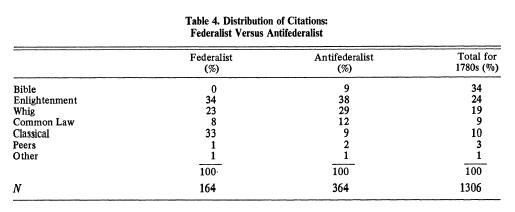Last weekend, David Barton continued his war on Christian colleges when he told an audience at Faith Baptist Church in Knightdale, NC that 50% of students at Christian universities deny their faith while in college. Watch:
[youtube]https://youtu.be/PBnk92GoKSQ[/youtube]
At 1:03 into the clip above, Barton said:
I mentioned before that between 60 and 80% of our kids deny their faith at university, you can at least send your kids to a Christian university, cause only 50% of them deny their faith at a Christian university. How does that happen? Because so many of the Christian profs we have get trained by pagan guys who think pagan in the way they go at it.
This isn’t the first time he has said this. As he did this time, he often couples his claim with criticism of Christian college professors. As with many of his other claims, he offers no evidence. Ultimately, in my opinion, this war on Christian colleges has more to do with self-defense than objective truth. Barton’s strongest critiques have come from Christian academics. He cannot claim we are on the left so he has to make up a cover story — in the case of this claim, he apparently thinks it helps him look better if he can convince audiences that Christian college professors only teach what their pagan graduate school professors taught them.
When I researched this claim before, I found nothing to support it. If anything, Christian schools are showing less erosion of faith commitments among their students.
A new wrinkle in Barton’s war on Christian colleges is the fact that the footnotes in his most recent book with George Barna (U-Turn) actually contradict his claim. In that book, Barna and Barton write about loss of faith for people under 30:
Most studies now show that roughly one-third of them [people under 30] have no connection to organized religion—and that their distaste for organized religion is growing steadily.4 Barna, George; Barton, David (2014-10-21). U-Turn: Restoring America to the Strength of its Roots (p. 26). Charisma House. Kindle Edition.
I can find nothing in the book which references Christian colleges.
The footnote about colleges in general goes to several surveys, none of which support Barton’s claims. One study in particular comes from Focus on the Family and suggests that doom and gloom predictions are wrong. Instead, they found that “only 18% of young adults raised with any religion are now unaf�fliated with a particular faith.” One of the authors of that study, Glenn Stanton, told me that Barton’s claims are actually discounted by current research. About Barton’s claim that 50% of Christian college students lose their faith, Stanton told me in an email:
That number is far too high even for kids at secular schools. No sound research data show anything near that.
Stanton then pointed me to a research brief he prepared for FotF which included some recent research on young people, college attendance, and religiosity. If anything, it is lack of college attendance which is associated with declines in religious participation. From the report:
Is College Corrosive to Faith?
In the last few years, social scientists have “found that the religiously undermining effect of higher education…has disappeared” and that a recent study “using some of the best longitudinal data available has shown that is not those who attend college, but in fact those who do not attend college who are most likely to experience declines” in religious participation and importance. An additional survey of college students found that 2.7 times more students said their faith was strengthened, rather than weakened, through their college experience.
Stanton added in an email:
In fact, the best research shows that all things being equal, young adults are more likely to abandon their faith if they don’t go to college, be it a Christian or secular school.
Sometimes Barton defends himself by telling audiences how many footnotes he has in his books. In this case, he should have read at least this one. David Barton’s war on Christian colleges has nothing to do with Christian colleges and everything to do with David Barton.


